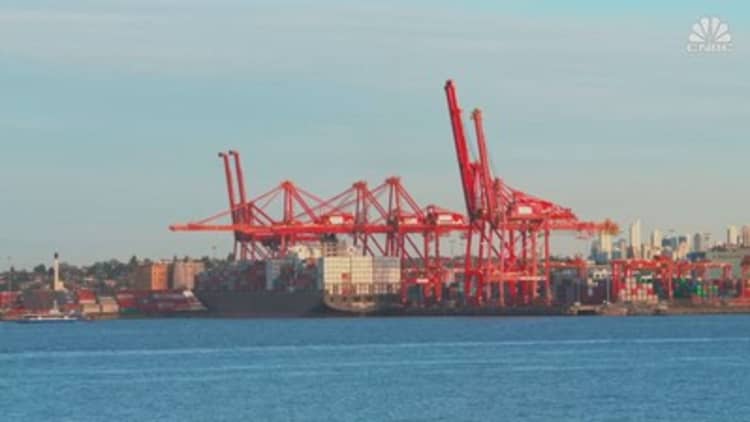Delivering containers are stacked on a dock at the Port of Vancouver on November 20, 2021.
Justin Sullivan|Getty Images News|Getty Images
After a 4th day of settlements, the British Columbia Maritime Employers Association informed CNBC that settlements with the International Longshore & & Storage facility Union Canada’s Longshore Department are presently stopped briefly, pending additional conversation with federal arbitrators.
” The BCMEA stays prepared to come back to the table at a minute’s notification, presuming that ILWU Canada is prepared to advance an affordable proposition. We are seeking to reach a reasonable and well balanced offer so ports can open and items can begin streaming as quickly as possible.”
The BCMEA stated on Monday that the ILWU Canada “appears to have actually entrenched their positions,” instead of working for a fair offer.
Canadian Labor Minister Seamus O’Regan required both celebrations to go back to the table.
The ILWU stated in a declaration the BCMEA “has intentionally screwed up” the development that was made on contracting out upkeep work.
The ILWU Canada declaration stated the federal government provided a 7% boost in base pay acknowledging the high expense of living.
” One would take a look at the transport market where companies have actually made their reasonable share of revenues in which their staff members had the ability to share in comparable boosts in line with what the federal government has actually currently acknowledged as sensible,” it stated.
As an outcome of the strike, Canada’s western ports have actually not serviced any vessels because June 30. This is producing a stockpile in trade with an overall of 29 ports on Canada’s West Coast at a dead stop.
Consisted of in this labor strife are the ports of Vancouver and Prince Rupert which jointly procedure and move practically 20% of U.S. trade. Products varying from crucial vehicle parts like brakes are processed through those ports in addition to extra vehicle and production parts, vacation products and durable goods.

Charlotte Cook, senior trade expert at VesselsValue, informed CNBC, “Strike action at the Port of Vancouver and Prince Rupert might have a considerable influence on transpacific freight streams, with the ports usually accepting an integrated average of 34 container vessels or 289,700 TEU (container) capability monthly.”
The worth of the combined 289,700 containers drifting off the ports of Vancouver and Prince Rupert reached $19 billion, based upon a $65,225 worth per container and Canadian customizeds information.
Prepare alerts vessel transit and turn-around times are anticipated to increase as an outcome of the strikes and blockage seems installing outdoors Vancouver, among Canada’s primary container ports.
The hold-ups Prepare explains resemble what logistics supervisors and carriers experienced throughout Covid. Hold-ups produce blockage which decreases the processing of trade and late costs, which are paid by carriers and usually handed down to customers.
This strike started on Saturday and likewise affects the railways which serve these closed ports. 3 Class 1 trains run at these ports: CN, Canadian Pacific, and BNSF, a subsidiary of Berkshire Hathaway
Logistics business like ITS Logistics are moving extra trucking capability to the railway terminals of Chicago and Detroit to vacate any containers ahead of the rise of containers that will follow when an offer is concurred upon and vessels can be unloaded.
ILWU Canada stated they hoped the BCMEA was not “concealing” behind the hazard of “back to work legislation” so they would not need to work out.
When CNBC inquired about the calls for federal government intervention, the labor minister’s workplace stated they are motivating both sides to work out at the table in mediation.